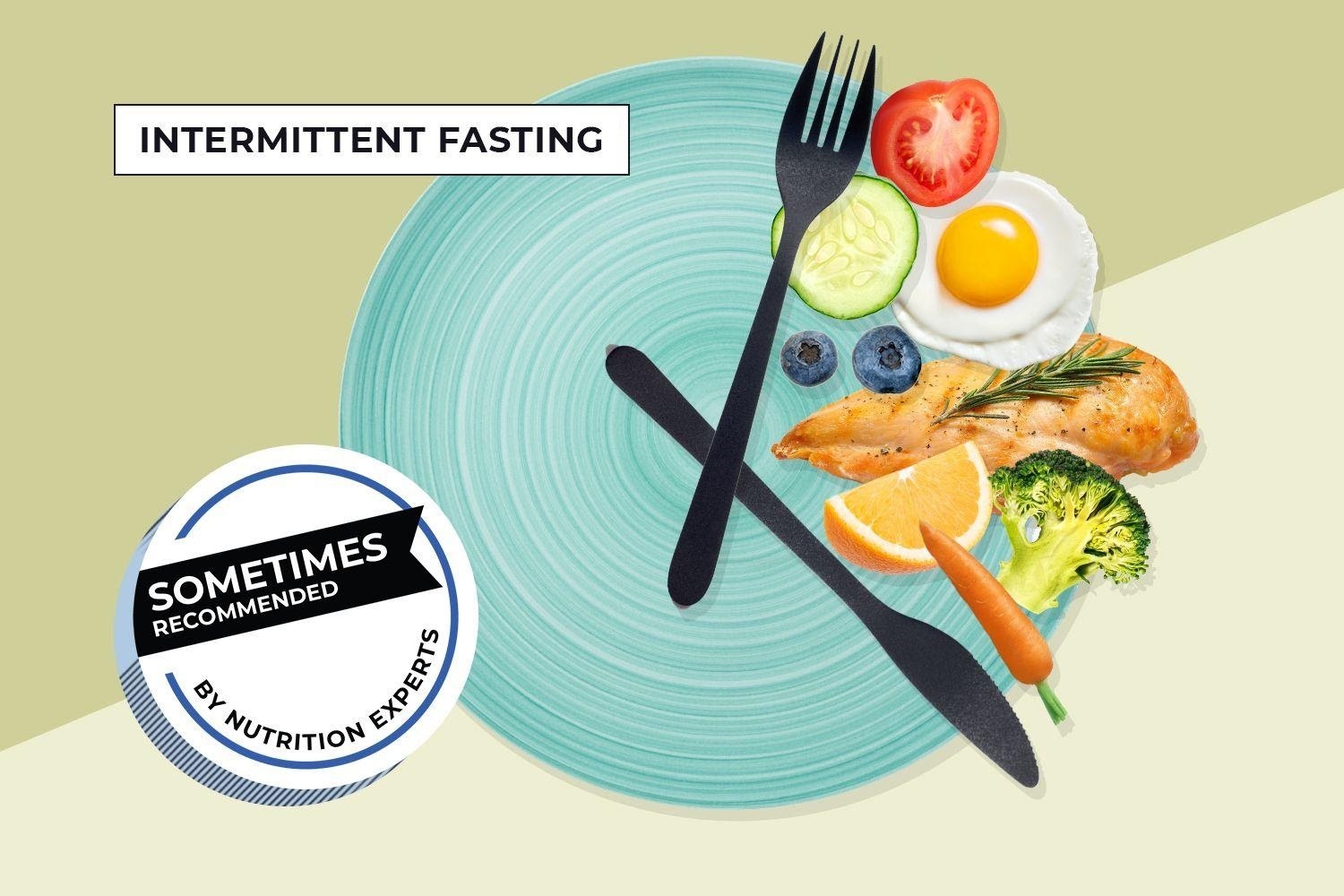The idea of not eating for 16 to 18 hours and then fitting all your meals in a window of 6 to 8 hours has gained massive popularity over the past few years. Widely known as intermittent fasting, it is a diet regimen that is considered to boost fat loss, lower blood pressure, and improve focus.
It is directly related to the benefits of autophagy, and some fitness experts suggest that it extends an individual’s lifespan. How does it work, what are the different patterns, and are there any downsides to intermittent fasting? Keep reading to find out!
- What Is Intermittent Fasting All About?
- Is Intermittent Fasting the Simplest Eating Pattern?
- The 16/8 Method
- The 5:2 Diet
- The Warrior Diet
- Cell and Hormone Repair
- Burning More Fat
- Reduces Oxidative Stress and Eliminates Free Radicals
- Benefits Your Brain
- Downsides of Intermittent Fasting

What Is Intermittent Fasting All About?
The biggest difference between intermittent fasting and all other diet regimens is that the former doesn’t determine the type of foods that you should eat.
This is the main reason why fitness experts talk of it as an eating pattern rather than a diet regimen.
The most common method is eating and drinking in a window of 8 hours and fasting for the next 16 hours. Fasting is something that we humans aren’t unfamiliar with.
Thousands of years ago, we were directed to eating larger quantities of food in a single sitting than being without any food for an extended period (hunter-gatherers, etc.).
In Relation to Religion and Spirituality
If I look at diet patterns from an evolutionary point of view, intermittent fasting is more natural than eating multiple meals throughout the day.
Most people relate fasting to practices in Christianity, Islam, and Buddhism, as restraining from food and drinks for a certain period of time helps achieve inner peace and improves mental clarity.
Is Intermittent Fasting the Simplest Eating Pattern?
Before we get into the most popular pattern, I want to discuss the theory that practicing intermittent fasting saves time, energy, and money.
This is an impressive life hack that allows you to spend much less time preparing your food and cleaning after multiple meals.
Not only that, but it is much easier to decide what you will eat when it is within a restricted time window.
Compared to complex diet regimens, such as keto or fat-free diets, intermittent fasting is much easier to maintain.
Fewer Meals
Apart from saving your time, intermittent fasting also results in more energy.
The fact that your digestive tract will get some off time will reflect in your focus and mental clarity.
The 16/8 Method
While there is a wide array of eating patterns, the most popular one is to fit two or three meals into an 8-hour timespan.
This was first started by Martin Berkhan, who argued the advantages of Leangains protocol and diet restriction.
In reality, intermittent fasting for 16 hours actually just comes down to skipping dinner or breakfast.
While you have absolute freedom to figure out a schedule for your meals, the most common one is to eat your meals between 12 PM and 8 PM.
What if You Feel Hungry?
Fitness experts suggest women are better off by fasting for 14 hours and eating for 10 hours. Adapting to this pattern takes some time.
Thus, if you are someone who is used to eating a big breakfast, the best way to curb your hunger is by drinking zero-calorie drinks, including water, coffee, and tea.
It should take less than a week for your metabolism to adapt to the new regimen.
The 5:2 Diet
This variation of conventional intermittent fasting was first recognized by fitness journalist Michael Mosley.
It comes down to maintaining a regular diet regimen for 5 days and eating 500 to 600 calories two days a week.
Keep in mind that the 5:2 diet doesn’t offer all the health benefits of intermittent fasting.
According to fitness experts, it is an efficient method for losing weight but doesn’t increase energy or boost metabolism in the long run.
Eat, Stop, Eat
Similar to the 16:8 regimen, fasting for 24 hours is gaining massive popularity.
While you can’t eat any solid food, you should drink water, coffee, and tea to stay hydrated and energized.
The best example of this method is restraining yourself from 7 PM Monday to 7 PM Tuesday. It is considered that people get optimal results if they fast for 48 hours (24×2) every 10 days.
The Warrior Diet
True to its name, the Warrior Diet may be the most complex out of all the mentioned regimens. It was founded by Ofi Hofmekler.
He argued the benefits of eating a light meal in the morning and a high-calorie meal in the evening. Similar to the paleo diet, you can start by eating breakfast between 8 am and 10 am.
The second step is to restrain yourself from feasting until 8 PM, when you can eat a larger meal that consists of meat, fish, and carbs.
Keep in mind that your first meal should be only fruits and vegetables. The idea is to eat as little processed food and sugary drinks as possible.
Diet Quality
A unanimous principle for all of the above-mentioned eating patterns is that you should focus on eating as healthy as possible.
Feasting on junk food for 4 hours and fasting for the next 20 hours isn’t as beneficial as enjoying well-balanced and highly nutritious meals.
Cell and Hormone Repair
An effect that intermittent fasting has on hormone levels is also widely discussed.
According to health experts, it starts a cell reparation process and results in more efficient weight loss.
With insulin levels dropping, you can expect to burn more fat. In addition to that, studies show that intermittent fasting boosts the human growth hormone (HGH).
HGH doesn’t only affect fat burning but also plays an important role in building more muscle mass.
Does it Affect Gene Expression?
The process of autophagy, which is initiated during a fasting window, results in eliminating the damaged cells and any waste material.
One of the coolest benefits is that it affects the gene structure and may extend your lifespan.
It also protects against diseases such as cancer, Parkinson’s, Alzheimer’s, and auto-immune conditions.
Burning More Fat
Millions of people are starting the intermittent fasting regimen to lose weight.
Naturally, the fact that you eat fewer meals results in eating fewer calories as long as you aren’t stuffing yourself down with food in those 6 to 8 hours.
As mentioned above, caloric deficit and HGH work together to facilitate weight loss. A few studies suggest that fasting for 1 to 6 months can result in a weight loss of 3 to 8% body fat.
Additionally, it seems that intermittent fasting targets the abdominal visceral fat, which many people have issues burning.
Lowers Risk of Type 2 Diabetes
Not only that, but due to the lowered insulin levels and boosted HGH, you will lose less muscle mass in this process.
With high blood sugar being related to insulin resistance, intermittent fasting greatly reduces the chance of type 2 diabetes.
Fasting reduces blood sugar levels by up to 30%. With that in mind, it is the best diet regimen for anyone who has a predisposition for developing this disease.
Reduces Oxidative Stress and Eliminates Free Radicals
Free radicals are the compounds responsible for causing oxidative stress, damaging DNA and protein cells in the process.
The result is premature aging and diseases such as cancer, Alzheimer’s, Parkinson’s, osteoporosis, and so on.
Fitness and health experts suggest that intermittent fasting reduces inflammation and helps your body fight free radicals.
Apart from protecting your DNA and protein cells, intermittent fasting is thought to lower blood pressure and heart rate.
Prevents Cancer
It can also balance the blood triglycerides, and increase good cholesterol (HDL) while decreasing so-called bad cholesterol (LDL).
By preventing the uncontrolled growth of cells, intermittent fasting is thought to minimize the risk of cancer and eliminate side effects in chemotherapy.
These studies are relatively new but hold great potential to discover holistic ways of preventing and fighting cancer.
Benefits Your Brain
As mentioned above, intermittent fasting reduces insulin levels and oxidative stress, fights inflammation, and improves metabolic functions.
In the past few years, studies on mice suggest that intermittent fading stimulates the growth of new nerve cells.
Not only that, but it initiates the production of BDNF, which is a hormone vital for preventing depression and brain damage.
As a modern neurodegenerative disease, Alzheimer’s doesn’t have a cure.
Extends Lifespan
With that in mind, the fact that intermittent fasting lessens the symptoms and removes waste material means that it can protect from this and other neurodegenerative diseases.
One of the most impressive findings on mice is that the group that fasted lived 83% longer than the group that didn’t.
Consequently, health experts and anti-aging enthusiasts suggest that intermittent fasting is an effective method for extending lifespans.
Downsides of Intermittent Fasting
Similar to any other eating pattern/diet regimen, intermittent fasting isn’t ideal for all groups.
Firstly, while it makes it easier to stay in a caloric deficit, using the 6-8 hour window to overeat will result in weight gain. Intermittent fasting isn’t a magic pill.
Nutrient-dense meals and fresh food are essential for staying below your calorie limit. The second downside is that you may feel sluggish and moody for the first 14 days of intermittent fasting.
The adaptation to the new eating pattern will take some time and depends on the diet regimen that you switched from.
Disordered Eating
Fortunately, zero-calorie drinks, such as coffee and tea, can help you maintain mental clarity during the fasting period.
Last but not least is the fact that intermittent fasting can drag people away from healthy eating patterns.
Seeing great results by not eating for 16 to 18 hours can lead to a disorder in a way that you may think it is best to restrain from food for good.
Summary
At the end of the day, intermittent fasting is an impressive method to maintain high energy levels, burn fat, and enjoy numerous health benefits.
With that in mind, it is vital to consult with your dietician and find an eating schedule that fits your routine.
